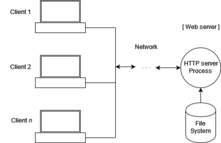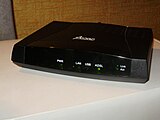A software process that runs on a host computer connected to the Internet to respond to HTTP requests for documents from client web browsers.
This article needs additional citations for verification. (March 2009) |
A web server is computer software and underlying hardware that accepts requests via HTTP (the network protocol created to distribute web content) or its secure variant HTTPS. A user agent, commonly a web browser or web crawler, initiates communication by making a request for a web page or other resource using HTTP, and the server responds with the content of that resource or an error message. A web server can also accept and store resources sent from the user agent if configured to do so.


The hardware used to run a web server can vary according to the volume of requests that it needs to handle. At the low end of the range are embedded systems, such as a router that runs a small web server as its configuration interface. A high-traffic Internet website might handle requests with hundreds of servers that run on racks of high-speed computers.
A resource sent from a web server can be a pre-existing file (static content) available to the web server, or it can be generated at the time of the request (dynamic content) by another program that communicates with the server software. The former usually can be served faster and can be more easily cached for repeated requests, while the latter supports a broader range of applications.
Technologies such as REST and SOAP, which use HTTP as a basis for general computer-to-computer communication, as well as support for WebDAV extensions, have extended the application of web servers well beyond their original purpose of serving human-readable pages.





